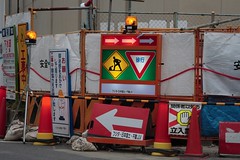Apr
16
2012

Construction Work (Photo credit: gullevek)
The global economy is struggling at the moment, and many countries are either going through, or attempting to come out of, a recession. The UK economy managed to grow a small amount in the first quarter of this year, narrowly avoiding a double dip recession, but there's still a lot of room for improvement in the economy, and the construction industry could do a lot to benefit the economy.
Construction is Valuable
The construction industry accounts for around 9% of the UK's GDP. According to Michael Ankers, a Construction Products Association executive, "The benefit of construction to the economy is well documented. For each British pound spent on construction, the economy benefits by 2.84."
The government is trying to encourage people to build their own homes as an inexpensive way to get on the housing ladder, and there are lots of new developments planned as ways of revitalizing old and ailing high streets. These initiatives should boost the construction industry, and as a result improve the rest of the economy.
Increased Employment and Trade
Improving the construction industry benefits the economy by creating new jobs - not just on the building site, but in other areas too. All of those bricks, roofing supplies, and timber need to be produced before they can be used on the site, and someone needs to transport the roofing supplies and other goods to the site. That means jobs in production and shipping, as well as the construction industry itself. Additional jobs will be created in the painting and decorating industry, and in the industries that supply the related products.
When the building is nearing completion, plumbing and electrical work must be done, again creating jobs. Positive changes in the construction industry gradually filter through to manufacturing, transport, inspection, and even personnel management jobs.
The construction jobs market is a competitive one. Several years ago, there was a skills shortage, and, as with other skilled trades, this led to increasing wages and a large number of people jumping on the construction bandwagon. When the recession hit, this pushed down wages and left many people unemployed. This sort of phenomenon is common in skilled trades, and the industry is slowly beginning to recover.
Incentives for Improvement
The construction industry was one of the first to feel the pinch when the recession hit, with higher house prices and less attractive mortgage terms greatly reducing demand for new builds. However, the industry as a whole has learned a lot from the recession, and is working towards reducing the likelihood of the boom-bust-recovery cycle of the housing industry.
Government incentives for eco-friendly buildings should provide enough work to support a large number of jobs over the next few years. The recent government spending review added one billion pounds to the country's "green bank", and also secured the future of several important infrastructure projects, but it also cut the country's social housing budget. If we want to see serious improvements to the state of the economy, then more government incentives may be required.
This was a guest article written by Amy Fowler on behalf of Ashbrook Roofing, specialists in roofing supplies.